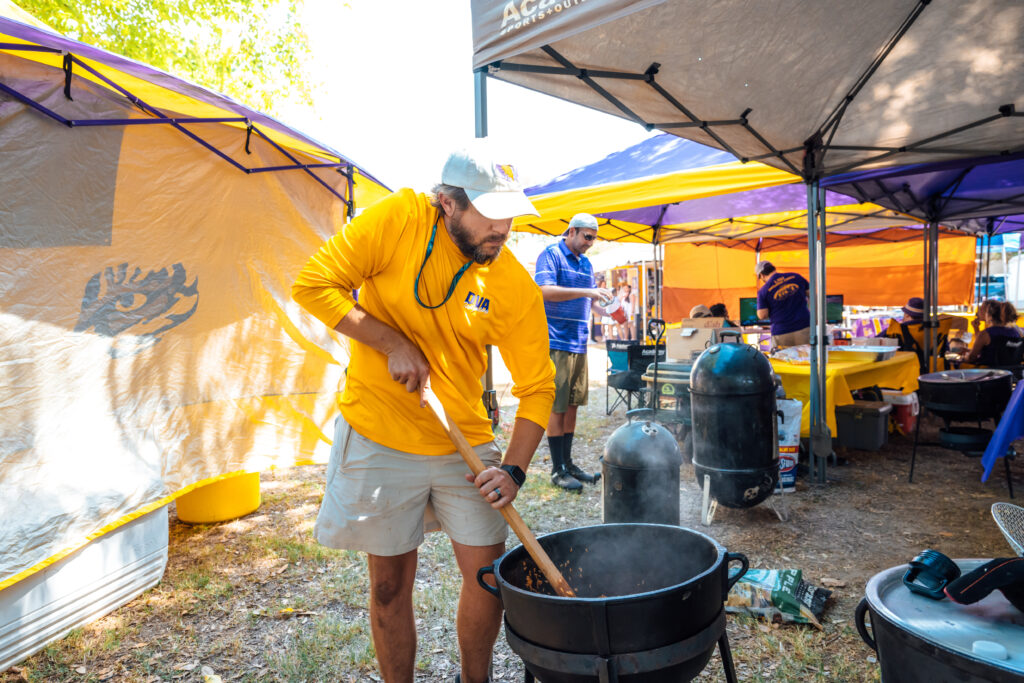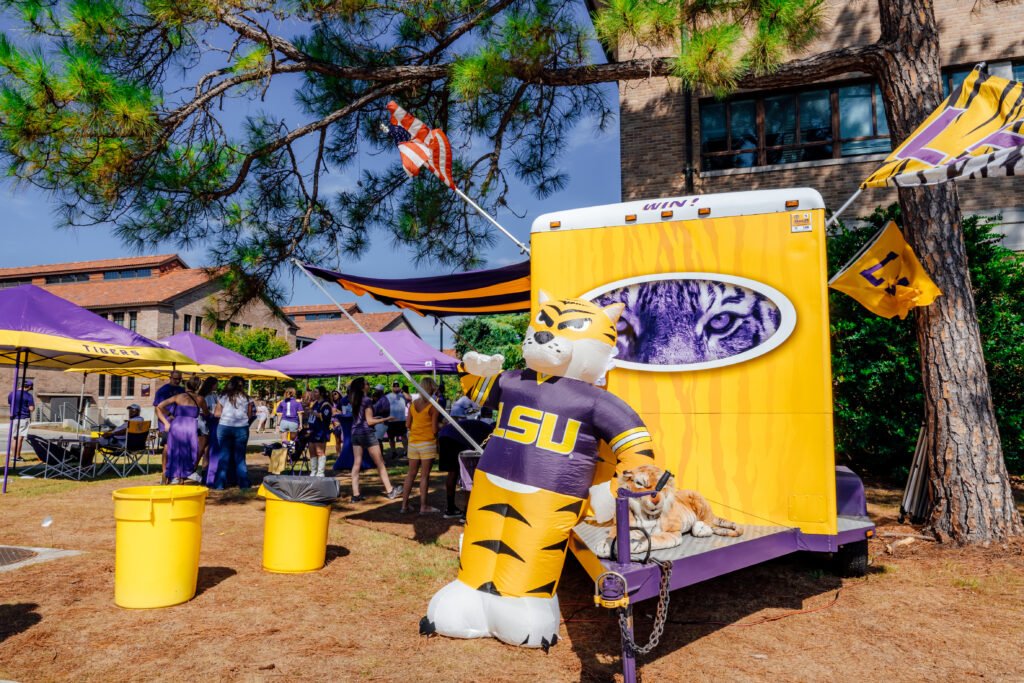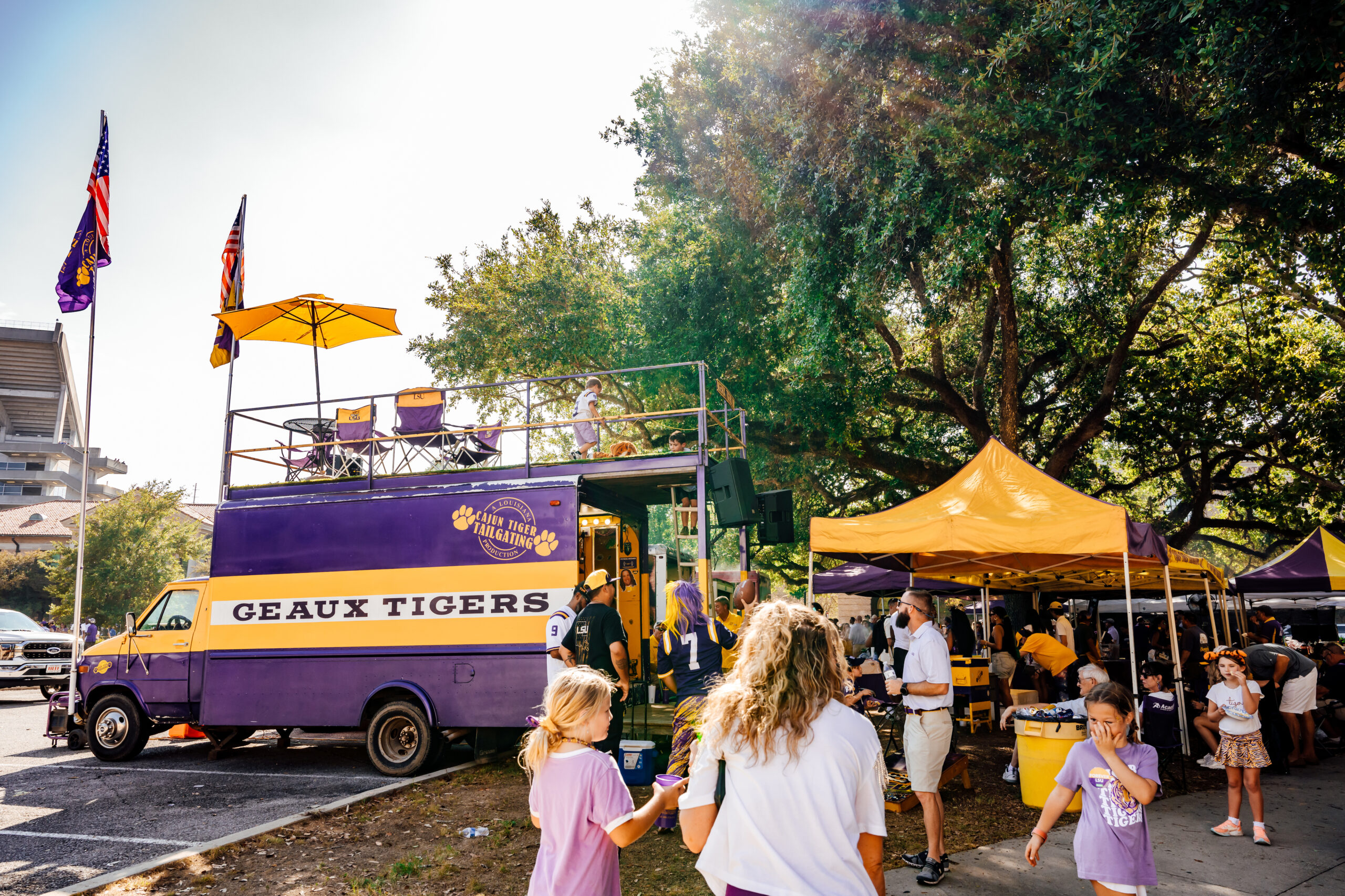
LSU tailgating has seen changes in recent years. Not everyone is a fan
This story was originally published in October 2023. It has been updated with information for the 2024 season.
If you ask veteran tailgaters like John Richardson, much has changed over the years in the world of LSU Football’s favorite pastime. Gone are the days when tailgaters could pull up to any grassy, shaded spot in the campus interior and lay claim to a choice location to pregame. Prime tailgating real estate has become increasingly restrictive due to expanding rules and pricy parking passes, diehards say.
“It’s certainly a different dynamic,” says Richardson, who 225 interviewed for a 2023 cover story on tailgating eats. The avid outdoor cook recalls sleeping overnight in a hammock at the Parade Ground when he started tailgating about 35 years ago to save spots for the gathering. “Now, you have to pay for parking, and every year, you see LSU encroach a little bit more on where you can tailgate,” he says.
For more than three decades, Richardson has been one of the chief architects of a longstanding tailgate party hosted by the family of District Attorney Hillar Moore and his siblings that takes place near the LSU War Memorial on the Parade Ground. As with all large-scale tailgates, orchestrating it is a massive undertaking that requires weeks of planning, organizing and ingredient sourcing. And for the last several years, it also requires purchasing seasonal parking passes to be able to park close enough to the sacred spot to haul equipment and food.
|
|
Parking has been the biggest change, Cody Worsham, former Associate AD/Chief Brand Officer of LSU Athletics, told 225 last year.
The university offers about 20,000 parking spaces to fans, with about 12,000 of them used by individuals with hang tags. That includes both staff and fans who have paid for seasonal parking passes. And while the university charges fans to occupy spaces in the highly congested campus interior, it still offers generous parking, according to Worsham.
“We have the most free parking of anyone else in the SEC,” he said.
Richardson adds that his longstanding tailgate has had a flurry of new neighbors lately. In recent years, fraternities have been required to set up on the Parade Ground rather than at their houses or on the campus of the nearby LSU Laboratory School where they had been previously.
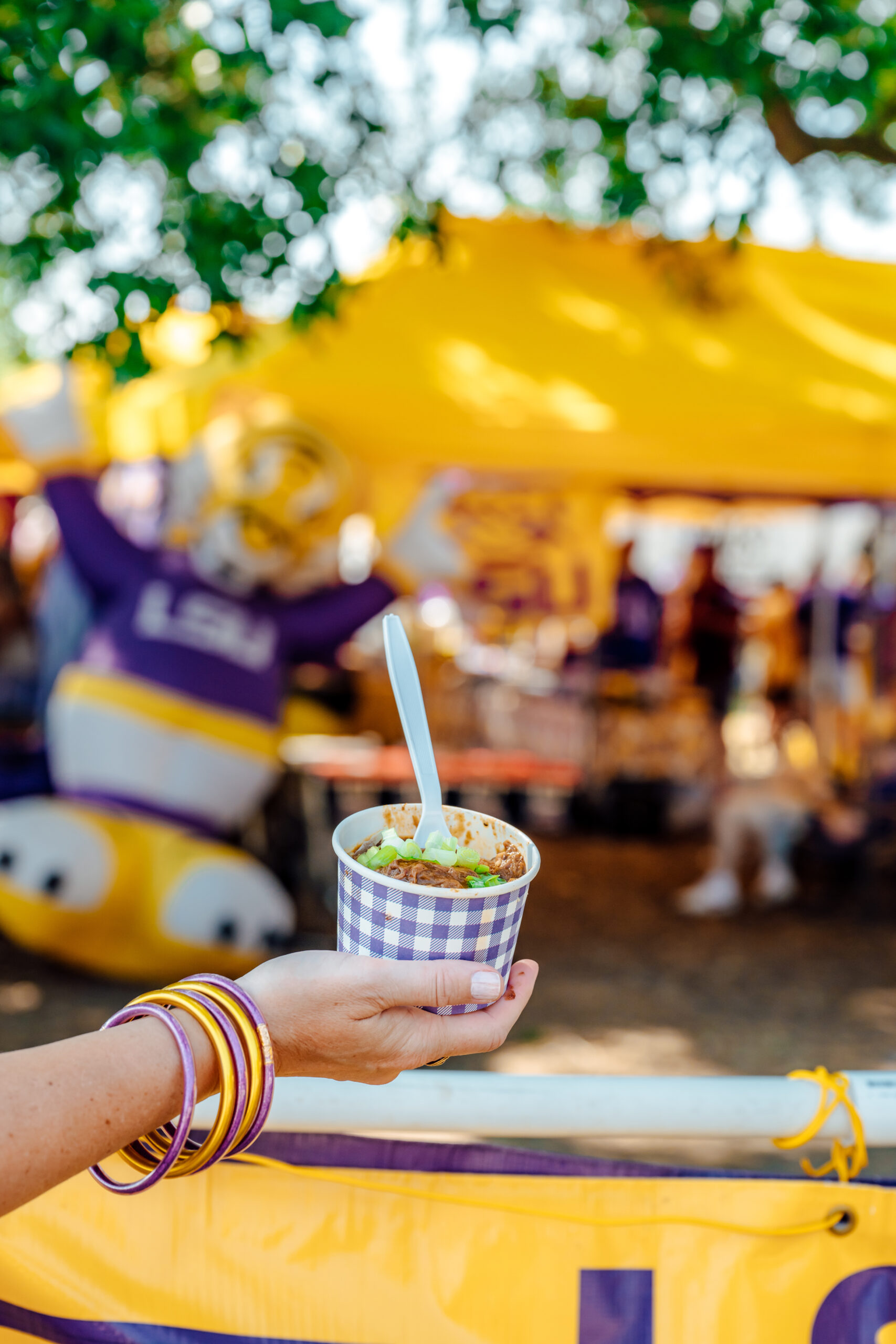
Tighter restrictions on tailgating means regulars have to bring their A-game when setting up. They know that at 5 p.m. on a Friday before a home game (the earliest LSU allows tailgaters to access the campus interior) they need to head for reserved parking spaces and begin staking out territory.
Richardson says it’s worth it because habitual tailgaters feel an emotional connection to their locations.
“It’s been really neat for 35-plus years to be in the same spot,” he says. “So people who went to LSU 20 years ago who used to remember coming out and tailgating with us just show up. You see random people throughout the day who know we’ve always been here.”
It’s still possible to find good tailgating locations, but it takes more effort, says culinary personality Jay Ducote, author of Jay Ducote’s Louisiana Outdoor Cooking. A seasoned tailgater who made numerous appearances on the Food Network, Ducote famously prepared a baby alligator for an ESPN College GameDay segment in 2019.

“LSU tailgating is still amazing and one of best in the country, but it used to be way more wide open with fewer restrictions,” Ducote says. “It’s pushed a lot of tailgating to the periphery.”
Moreover, LSU tailgating is defined by longstanding DIY charm, with fans hauling all manner of rigs onto campus to prepare dishes like jambalaya, gumbo, fried fish, wings, ribs and brisket.
“People actually cook,” Ducote says. “That’s one of the things that people associate with us.”
But not everyone has the time or energy to host a traditional LSU tailgate.
Enter turnkey services, another big change to game-day culture.
Since 2018, a university-sanctioned commercial vendor has been providing tailgate set-ups and catering in areas that now include Patrick F. Taylor Hall and Nicholson Gateway. Operated by Revelry Sports & Entertainment since 2019, this season’s packages range from mini tailgates for a single game for $1,000 to the Revelry XL setup for 300 fans at a custom price. Private tailgate packages for this weekend’s LSU vs. Alabama match-up, ranging from $2,050 to $7,500, are sold out.
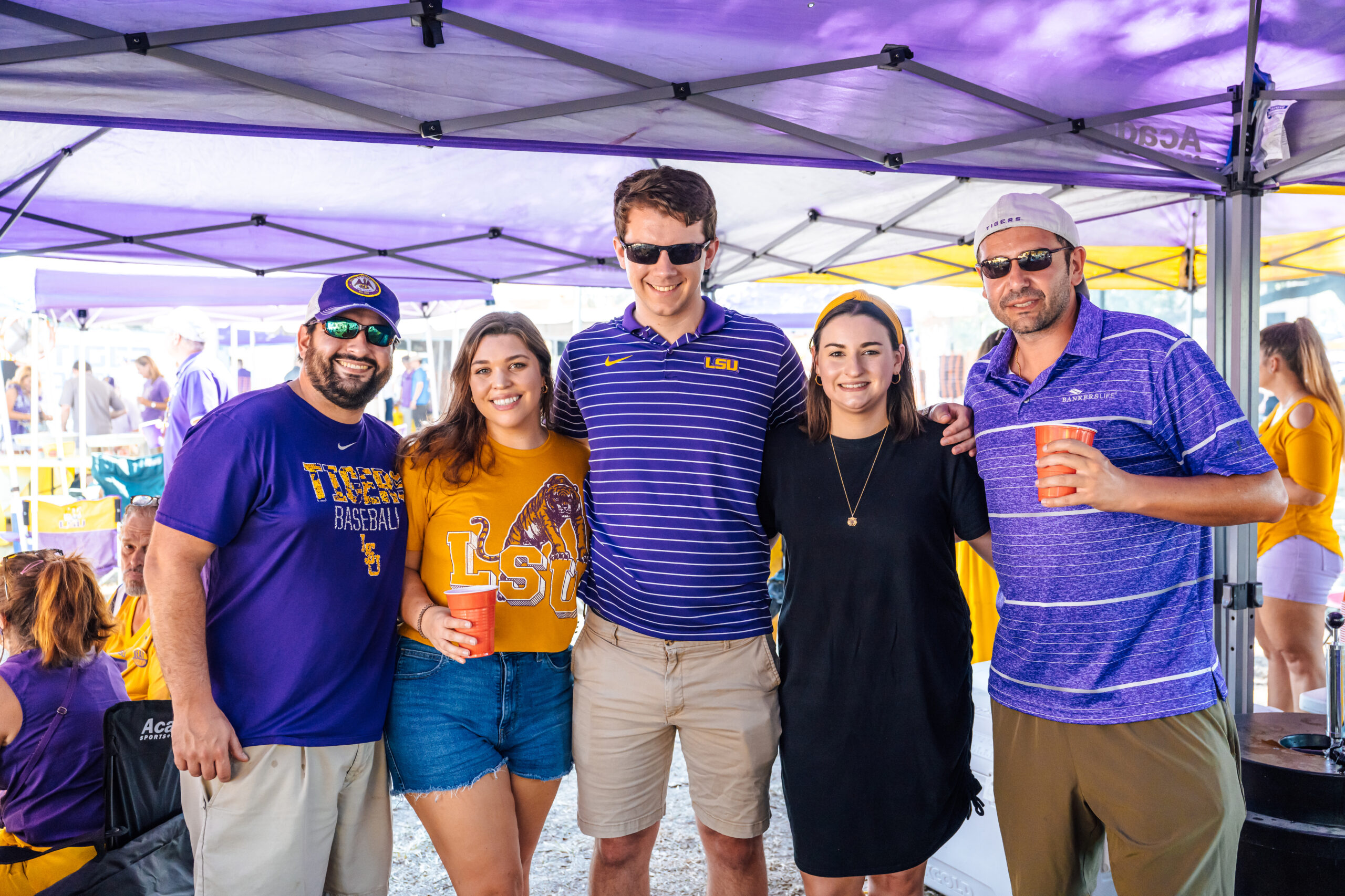
“The goal is to expand services to a broader audience,” Worsham told 225 last year. “You have people who come in for games from out of town, and they don’t have time to haul equipment and food. They need a turnkey solution. This has been designed with that fan in mind. You don’t want 100% turnkey tailgating, but you also don’t want 0%.”
For his part, regular tailgater Zack Rau remains positive about LSU’s emblematic tailgate culture and says the changes are no different than in other parts of life.
“Parking for our trailer has gotten more expensive, but that’s in line with society at large,” Rau says.
LSU Athletics makes tweaks to game-day culture every year often in response to fan feedback on post-game surveys, according to Worsham. For example, past confusion over parking lots led to the creation of a color-coded parking system in 2021, he said.
Stay up on current game-day policies here. LSU takes on the Alabama Crimson Tide at Tiger Stadium this Saturday, Nov. 9, at 6:30 p.m.
|
|
|
